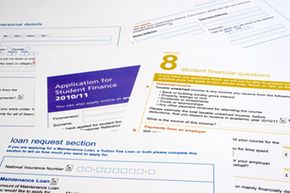 “Bankruptcy usually doesn’t affect your student loans, but that does not hold true in all cases.Ian Jeffery/Getty Images
“Bankruptcy usually doesn’t affect your student loans, but that does not hold true in all cases.Ian Jeffery/Getty Images
Your love of Romance languages — Spanish, Portuguese, French, Italian and Romanian — knows no bounds. So much so that, instead of seeking employment after earning a bachelor’s degree, you decided to enter grad school. Now, with those heady years of academe behind you, life is a harsh reality filled with unanswered resumes and desperate attempts at temporary employment. You’re still waiting for your ship to come in, perhaps in the form of a professorship at a major university. Meanwhile, unpaid bills are piling up and you spend most of your days avoiding calls from collection agencies. With your financial situation sinking fast, bankruptcy seems like the only viable life preserver.
But will it save you from your student loans? There’s a widely held notion that student loans cannot be discharged during bankruptcy. While this holds true for many, it’s not set in stone. It may not be an easy path, but it’s entirely possible to exit a bankruptcy proceeding with your student loans forgiven.
In fact, an article published in a 2012 issue of American Bankruptcy Law revealed a surprisingly high percentage — as high as 40 percent — of bankruptcy filers with student loan debt successfully lobbied to have the debt canceled. The article also reported that the number of those who seek forgiveness of student loans is staggeringly low; as few as .1 percent of student loan holders who filed for bankruptcy actually asked for the loans to be discharged [source: Iuliano].
Most bankruptcy courts apply what’s called the Brunner Test to bankruptcy filers who want their student loans canceled. The name is derived from a court case in which a debtor filed for bankruptcy, seeking to have her student loans discharged. The three-pronged Brunner Test requires a debtor to demonstrate:
- A good-faith effort to increase earnings while decreasing expenses
- That the student loans are preventing the debtor from experiencing a minimal standard of living
- That the current financial hardship will continue for a "significant portion of the repayment period"
In short, debtors must be broke and able to show that they’ll remain that way for a long time. So long as there’s little hope they’ll be able to repay the loans. Even if the full amount of student loan isn’t discharged, there have been cases in which a portion of the loan or the interest owed on the loan has been canceled. Without a discharge, you’ll still need to repay your student loans [source: Clark].
A bankruptcy should have little effect on your future applications for student loans, but your credit history will. For anyone who has filed for bankruptcy, regardless of whether student loans are discharged, rebuilding good credit is an important determination for future student loans. If you are required to repay your student loans after bankruptcy, you’ll want to keep them in good standing. If your student loan goes into default because you didn’t make payments, it will be difficult to receive federal student aid [source: FinAid].
Lots More Information
Related Articles
- 10 Famous Commencement Speeches
- 10 Olympic Games That Nearly Bankrupted Their Host Countries
- How to Shop for College Kids
- How Bankruptcy Works
- 10 Most Spectacular Lottery Burnouts
Sources
- Clark, Patrick. "You Can Get Student Loans Forgiven in Bankruptcy, but It’s Far From Easy." Businessweek. May 6, 2014. (Sept. 16, 2014) http://www.businessweek.com/articles/2014-05-06/you-can-get-student-loans-forgiven-in-bankruptcy-but-its-far-from-easy
- Iuliano, Jason. "An Empirical Assessment of Student Loan Discharges and the Undue Hardship Standard." American Bankruptcy Law Journal. July 24, 2011. (Sept. 16, 2014) http://papers.ssrn.com/sol3/papers.cfm?abstract_id=1894445
- FinAid. "Bankruptcy and Financial Aid." (Sept. 16, 2014) http://www.finaid.org/questions/bankruptcy.phtml


